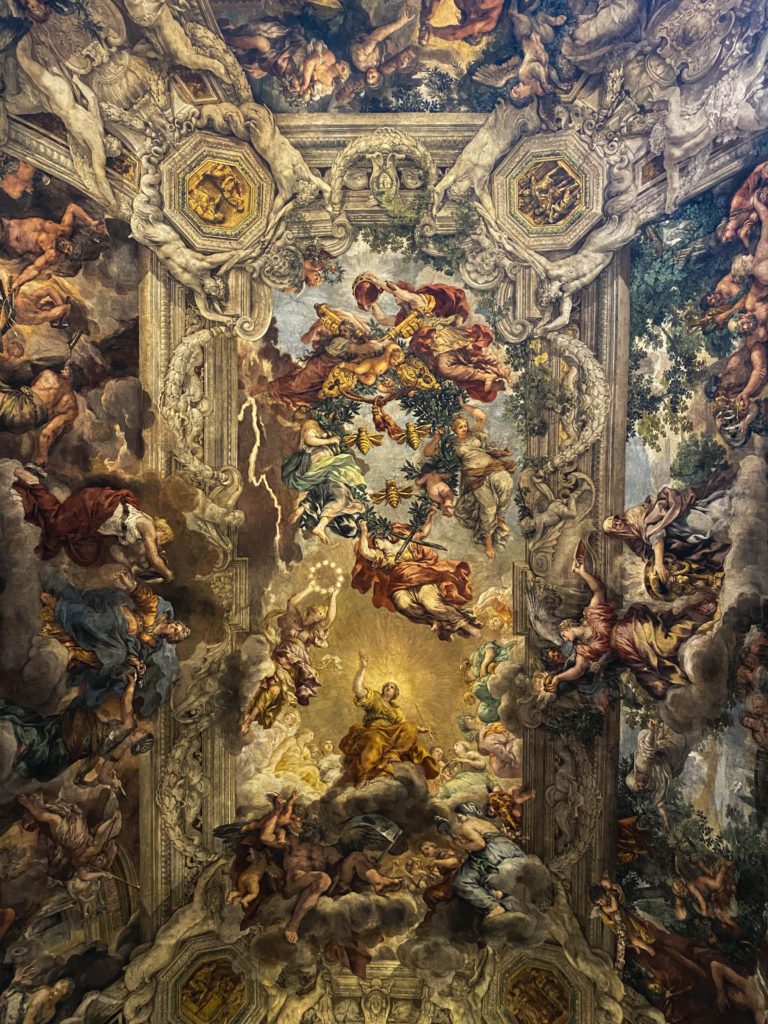
Published May 2, 2022
This essay is excerpted and adapted from comments delivered on April 29 at the Scala Foundation’s conference “Art, the Sacred, and the Common Good.”
Back in my Jesuit high school days, when dinosaurs walked the earth—this was the 1960s—Bob R. was one of my best friends. I haven’t seen Bob in many years, but I still think of him with affection. We were both weird. We were book buddies and debate partners, we took Latin and Greek together, and we shared the experience of reading bits of Catullus and Virgil, Xenophon and Homer in the original.
Bob had wonderful parents. His dad was a great guy, but his mother was extraordinary. She was a beautiful woman—in her early fifties, poised, trim, well-dressed, feminine. But that’s not what I meant then—or what I mean now—by the word “beautiful.” The beauty was in her face. It had character. It had the kind of grace and weathering that’s sculpted by a life well lived; the marks of joy, hard work, and suffering, but also confident goodness. And those qualities radiated out to fill Bob’s family home with a palpable spirit of welcome.
Bob and I graduated together, and he went off to Fordham and I went off to Notre Dame. And the next time I visited Bob’s home—halfway through my freshman year—the woman I just described was gone. The plastic surgeon had done a great job. Bob’s mother looked five or 10 years younger. She was still generous and feminine; but also different. Her face had quite literally been lifted—or, more accurately, discarded and replaced by something new.
I’m not sure why she did it. As we get older the temptation to be dissatisfied with our lives, the fear of aging that can drive our personal vanity—these things grow stronger. A culture of consumption feeds on that restlessness and profits from the anxiety that so often animates our desires. In the process, it steals something distinctively human from us. It reduces us to a bundle of material appetites, and it resents anything transcendent because questions about meaning threaten the machinery of wanting and possessing more.
Beauty—real beauty—has diminished in our daily lives. Real beauty draws us up and out of ourselves; it connects us to realities that can’t be commodified. It re-sacralizes the world, even if only for a moment. And in doing that, it indicts the vulgarity and disorder of contemporary life.
I remembered all this a few months ago while speaking with a friend about Roger Scruton’s book The Face of God. In that text, Scruton writes that “the [human] face shines in the world of objects with a light that is not of this world—the light of subjectivity.”
We humans are animated carbon, just like every other animal. We have instincts and reproduce more or less like every other animal. But we’re not like any other animal. We’re conscious of both our individuality and our mortality, which explains both our fear of loneliness and our need for meaning. We’re the only species that buries and reveres its dead. It’s in our nature to want more than this life, or at least to sense that something more and higher might be possible.
Later in the same text, Scruton writes:
Take away religion, philosophy, take away the higher aims of art, and you deprive ordinary people of the ways they can represent their apartness. Human nature, once something to live up to, becomes something to live down to instead. Biological reductionism nurtures this “living down,” which is why people so readily fall for it. It makes cynicism respectable and degeneracy chic. It abolishes our kind, and with it, our kindness.
Beauty is an affirmation of our shared human dignity. It reminds us of life’s goodness in an age of transgressive narcissism and repudiation of the past. This is why, in my own Catholic tradition, today’s hostility to high culture, to excellence and precision in the life of the mind, and more recently and narrowly to the traditional Latin Mass, can seem so strange. I grew up with the old form of the Mass. I have no desire to go back to it. It could often be mechanical and uninspiring, and the liturgical reforms of the Second Vatican Council were overdue and necessary. When done well, the Novus Ordo is both reverent and moving.
What the old Mass did have, though, when a priest celebrated it with humility and conviction, was a tactile beauty that appealed to all the senses, especially sight, sound, and smell. And in doing that, it vividly communicated the mystery of an invisible reality—a God radically holy, a God radically “other than” us, but at the same time intimate, loving, and incarnate in our humanity.
People leave the Catholic Church and the wider Christian community today for many different reasons. But one of those reasons is the unconvincing, bourgeois mediocrity that’s too common in our worship—which then infects the whole atmosphere of Christian life. What Scruton called “the flight from beauty”—the urge to desecrate and erase the sacred—is a fundamental illness of the modern age. No religious community is immune to it. But ugliness kills the spirit. It dumbs down the imagination, softens the brain, and hardens the heart. People of faith have a hunger for beauty and mystery. They hunger to belong to a story—the story of a living, believing community, ongoing and true across cultures and time. And they’re too often not getting that in their local churches.
In his book Beauty: A Very Short Introduction, Scruton wrote,
Our need for beauty is not something that we could lack and still be fulfilled as people. It is a need arising from our metaphysical condition, as free individuals seeking our place in a shared and public world. We can wander through this world, alienated, resentful, full of suspicion and distrust. Or we can find our home here, coming to rest in harmony with others and with ourselves. The experience of beauty guides us along this second path: It tells us that we are at home in the world, that the world is already ordered in our perception as a place fit for the lives of beings like us. But beings like us . . . become at home in the world only by acknowledging our “fallen” condition . . . Hence the experience of beauty also points us beyond this world to a “kingdom of ends” in which our immortal longings and our desire for perfection are finally answered.
For Scruton, the instinct for beauty and the religious frame of mind are closely related, and vital for human flourishing. They both flow from a humble sense of human imperfection that reaches for the transcendent.
What I see in the face of my wife, the woman I’ve loved and shared a life with for the past 52 years, is not just the pleasing color of her eyes, or the graceful arrangement of her features—although I’m quite happy about both, thank you very much—but a harmony of soul and action, a harmony of the inner self, the self she gives away freely to others. That kind of beauty shines outward. It gives light, and warmth, and life.
Beauty is the forgotten element of human dignity and free societies. We need beauty to spark our imagination, to guide our scientific intuitions, and to see God’s reality, clearly and directly. Beauty reminds us that higher things do exist; that we can know, and live in, the light of truth; and that we can reflect that light to promote the common good. And that work of living and reflecting the light belongs to each of us.
Francis X. Maier is a senior fellow in Catholic studies at the Ethics and Public Policy Center, and the 2020-22 senior research associate at Notre Dame’s Center for Citizenship and Constitutional Government.
Photo by Francesco Bianco on Unsplash
Francis X. Maier is a Senior Fellow in the Catholic Studies Program at the Ethics and Public Policy Center. Mr. Maier’s work focuses on the intersection of Christian faith, culture, and public life, with special attention to lay formation and action.











